Detail: Karthik Pandian, *Unearth*, Whitney Museum of American Art, 2010
Late Culture in the American Bottom
Karthik Pandian
Nov 17, 2011
(6pm)
Talk
Please RSVP
Graham Foundation grantee and artist Karthik Pandian will reflect on the series of 16mm films and sculptural exhibitions that he produced out of his research at the Cahokia Mounds, a complex of pre-Columbian earthen edifices that dot the landscape east of St. Louis, IL, and the ancient Midwestern modernism he found buried there.
Karthik Pandian’s practice seeks to unsettle contradictions — universal and contingent, sacred and profane, proximate and distant — at the heart of the monument. Concerned in particular with the way in which history lurks in matter, Pandian uses 16mm film to excavate sites for fragments of political intensity. The sculptural works that support, enshroud and sometimes obscure his film projections are produced from materials drawn from his site research and often assume the form of architectural constructions. Through moving image, sculpture and syntheses of the two, his work imagines freedom in relation to the impositions of architecture.
Pandian has had solo exhibitions at the Whitney Museum of American Art, New York; Midway Contemporary Art, Minneapolis; White Flag Projects, St. Louis; Richard Telles Fine Art, Los Angeles; and Galerie Meyer Kainer, Vienna. His work has been the subject of numerous published writings, including a feature in Artforum and a catalogue essay by anthropologist Michael Taussig. Pandian's exhibitions have been supported by grants from the Graham Foundation for Advanced Studies in the Fine Arts and the Durfee Foundation amongst others. He received his MFA from Art Center College of Design, Pasadena, CA and his BA from Brown University, Providence, RI.
Related Links
Midway Contemporary Art
http://www.midwayart.org/exhibitions/10_05_karthik_pandian/
Karthik Pandian: Unearth, Whitney Museum of American Art
http://whitney.org/Exhibitions/KarthikPandian
Related Grant: Before the Sun
http://grahamfoundation.org/grantees/3785-karthik-pandian-before-the-sun

Matej Vakula, Luxury Packaging, 2007, wrapped statues, Academy of Fine Arts & Design, Bratislava, Slovakia. Photograph by Pamela Miller
Revolution, Transformation, and Identity: Central European Artists Reflect upon Post-Communist Art, Urbanism, and Culture
Janeil Engelstad
Oct 30, 2011
(3pm)
Panel Discussion
Please RSVP
After the disintegration of the Soviet bloc, personal and collective identity became a major theme for many Central European artists and writers. Freed from the requirement to actively take part in the building of a socialist society, artists began to publicly examine personal histories, national memory, and the impact of Socialist Realism. Throughout the region, newly organized governments began the process of forging new national identities, while also investigating the impact of communism upon individuals and society. It was an idealistic time when many people held the belief that the utopia unrealized under socialism could be built and sustained by adopting democratic and cultural values. This initial civic optimism, which embodied the first post-communist governments and constitutions changed to disillusion as these developing democracies faced the political, cultural and economic pressures of capitalism and globalization.
Reflecting upon the broader cultural milieu, as well as their own work, the panel will discuss how the influences of democracy, capitalism, and globalization have defined contemporary Central European society and culture. They will also address how these forces have impacted the design of the built environment and shaped the generation of artists born after the fall of the Berlin wall.
Janeil Engelstad (USA) is an artist, curator and educator who, working independently and collaboratively, produces exhibitions and projects throughout the world. In 2009 she produced Voices From the Center: Central Europeans Reflect on Life Before and After the Fall of The Berlin Wall, a multiform project that stemmed from her experience as a Fulbright Scholar at the Academy of Fine Arts and Design in Bratislava, Slovakia.
Oto Hudec (SK) is a visual artist whose work includes exhibitions and installations in public spaces that examine immigration, refugees, the rights of indigenous people, and the impact of globalization upon the natural environment. His work has been exhibited throughout the world and was featured in the 2009 Bienal Mercosul in Porto Alegre, Brazil.
Magda Stanová (SK) is a visual artist whose interest lays in urban development, cartography, analysis of creative processes, theory of photography, and history of ownership. In 2008, her book W cieniu fotografii was published by Foundation for Visual Arts in Krakow, Poland and in 2009, she was nominated for the Discovery Award in Rencontre d'Arles festival in France.
Miklós Surányi (HU) is a Budapest based photographer whose images paint an intimate portrait of Hungarian society and culture. He has exhibited throughout Europe and Asia and his work has been published in several Hungarian publications, including limited edition portfolios published by Budapest’s Lumen Gallery.
Matej Vakula (SK) is an artist and curator working in a variety of media, often using public space as a vehicle to explore how the political becomes personal, the personal becomes political, and the politics of site. His work has been exhibited throughout Europe and the United States and has been featured in Art Forum and other media outlets.
Jan Worpus (PL) is a principle at Grafixpol, a design studio based in Łódź, Poland that works in a variety of mediums and formats to create digital and printed materials that convey the ideas, emotions and essence of society and culture. Grafixpol designed the interactive website for Voices From the Center.
This event is co-hosted with Three-Walls in Chicago and is in concurrence with the project Voices from the Center, material of which continues to be presented in lectures and exhibitions throughout Central Europe and the United States. For more information visit http://www.voicesfromthecenter.net/

Image: Anna María Ramos
Roc Jiménez de Cisneros
Oct 22, 2011
(8pm)
Performance
Please RSVP
Lampo and the Graham Foundation are pleased to present a performance by Roc Jiménez de Cisneros. Here, in his first Chicago appearance, he will premier “Tetralemma + Tetrafluoroethane,” a new 4-channel work for electronic sounds and hand-held air horns. Present in the work are two subjects: Mereology, or the theory of part-whole relations as it applies to the playback system and compositional structure, as well as the concept of imitation in music, wherein this and other recent performances emulate the aesthetics and techniques in his computer work. Sending similar, but not identical, audio streams to each speaker, Roc attempts to raise several questions: How does the interaction between different channels affect the overall structure of the work? Can we perceive parts within the parts? Can we really focus our attention on one specific source?
Roc Jiménez de Cisneros (b. 1975, Barcelona) is an artist and composer and co-founder of the computer music project EVOL, which began in 1996. His work is a radical and playful exploration of algorithmic composition. Heavily influenced and inspired by cosmology, noise and rave culture, he describes his recordings, installations and performances as "computer music for hooligans." His output has been released on labels such as Entr'acte, Presto!?, Mego, Fals.ch and ALKU, which he runs with Anna Ramos. He has performed extensively throughout the world. He lives and works in Barcelona.
This performance is presented in partnership with Lampo. Founded in 1997, Lampo is a non-profit organization for experimental music, sound art and intermedia projects. For information and to add your name to the Lampo list, contact info@lampo.org or visit http://www.lampo.org.

"How did she find herself here? Nancy Holt, 1973-76" A slide installation by Ginger Brooks Takahashi, 1997/2007
How Did She Find Herself Here? A Working Seminar on Artistic Collaboration, Feminist Strategies, and the Work of Nancy Holt
Ines Schaber & Ginger Brooks Takahashi
Oct 21, 2011
(11am)
Workshop
Please RSVP
Although Nancy Holt has rarely engaged with feminist debates, much of what has been written about her work seeks to inscribe her into a fixed gendered position in relation to the history of Land art. This positioning has historically precluded a more nuanced engagement with questions of artistic production and subjectivity. On the occasion of the Nancy Holt: Sightlines exhibition at the Graham Foundation, two artists—Ginger Brooks Takahashi and Graham Foundation grantee Ines Schaber—consider the role that personal history has played in the reception of Holt's work. Each of them will introduce a new set of propositions on the theme of artistic collaboration through a presentation of their independent work and research in an open discussion format with seminar participants. The discussion will be moderated by Alena J. Williams, Columbia University, New York.
Ines Schaber lives and works in Berlin. She studied fine arts at the Hochschule der Künste, Berlin and architectural theory at Princeton University as a DAAD fellow. She is completing her doctorate in Visual Cultures/Center for Research Architecture at Goldsmiths in London on archival practices in image archives. Her work has been shown at the Storefront for Art and Architecture, New York, Actar Gallery, Barcelona, and KW - Institute for Contemporary Art, Berlin. Schaber was a lecturer / guest professor at a number of international institutions, including the Royal Academy in Copenhagen, the University of Arts in Berlin, Zeppelin University, and the Art Academy in Zurich.
Ginger Brooks Takahashi lives in North Braddock, Pennsylvania and Brooklyn, New York maintaining a social, project-based practice. She produced and performed in the live touring band MEN from 2008 - 2010. She is co-founder of LTTR, a queer and feminist art journal, and projet MOBILIVRE BOOKMOBILE project, a traveling exhibit of artist books and zines. She received her Bachelor of Arts from Oberlin College and is an alumna of the Whitney Independent Study Program. Her work has been presented in the context of exhibitions and programs at the Serpentine Gallery in London, documenta 12 in Kassel, Textile Museum of Canada in Toronto, and the New Museum in New York.
Alena J. Williams is the curator of Nancy Holt: Sightlines, the traveling exhibition on Holt's Land art, films, video, and related works from 1966 to 1980. She is a doctoral candidate in modern and contemporary art in Art History at Columbia University. Williams was a fellow in the postgraduate research group “Media of History – History of Media" at the Bauhaus-Universität Weimar and the recipient of the German Chancellor Fellowship from the Alexander von Humboldt Stiftung. Her publications include Nancy Holt: Sightlines (UC Press, 2011) and Light Is a Kind of Rhythm (merz&solitude, 2009).
Please note that this seminar is open to architects, artists, educators, and graduate and advanced undergraduate students only. Space is limited.

Desert Resonator, 2011. Sonic sculpture permanently installed at the CLUI Desert Research Station, Hinkley CA. Deborah Stratman and Steven Badgett.
Forces & Gazes
Deborah Stratman
Oct 20, 2011
(6pm)
Talk
Please RSVP
Framing lines of sight is an unavoidable part of the filmmaking practice. We encircle the gaze with a vectored view and we necessarily remove with every look, editing most of the world out in order to arrive at a shot. Considering the phenomenological power relationships that are native to this simple act are a central part of Stratman's practice. Equally central have been a commitment to landscape, infrastructure, socio-political histories and ways of knowing.
The talk will highlight resonances between some of Stratman’s recent (and future) projects and that of Nancy Holt. In particular, the recent public installations “Desert Resonator” and “Augural Pair,” (collaborations with artist Steven Badgett), and the in-progress “Sinkholes” project. Nancy Holt: Sightlines will be on view at the Graham Foundation from October 7 through December 17, 2011.
Deborah Stratman is a Chicago-based artist and filmmaker interested in landscapes and systems. Her films, rather than telling stories, pose a series of problems - and through their at times ambiguous nature, allow for a complicated reading of the questions being asked. Many of her films point to the relationships between physical environments and the very human struggles for power, ownership, mastery and control that are played out on the land. Most recently, they have questioned elemental historical narratives about freedom, expansion, security, and the regulation of space. Stratman works in multiple mediums, including photography, sound, drawing and sculpture. She has exhibited internationally at venues including the Whitney Biennial, MoMA, the Pompidou, Hammer Museum and any international film festivals including Sundance, the Viennale, Ann Arbor and Rotterdam. She is the recipient of Fulbright and Guggenheim fellowships and she currently teaches at the University of Illinois at Chicago.
For more information on the exhibition, Nancy Holt: Sightlines, click here.

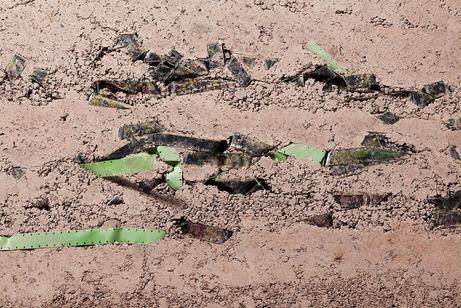
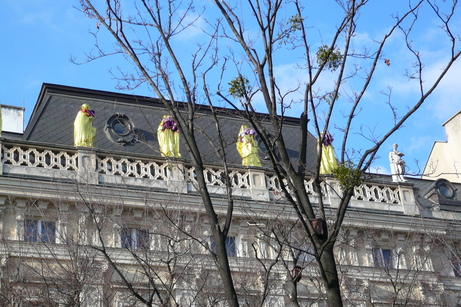
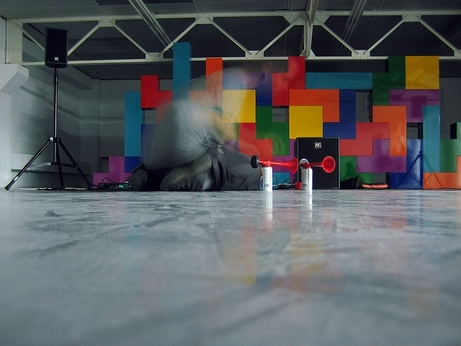
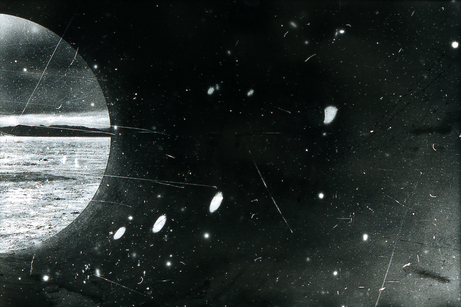
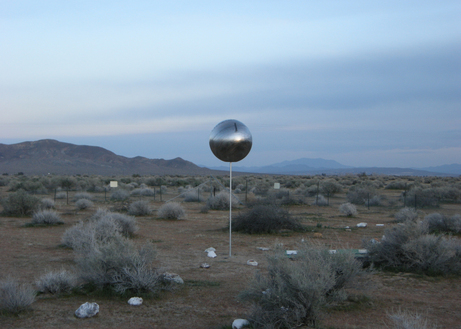
 PREVIOUS POSTS
PREVIOUS POSTS